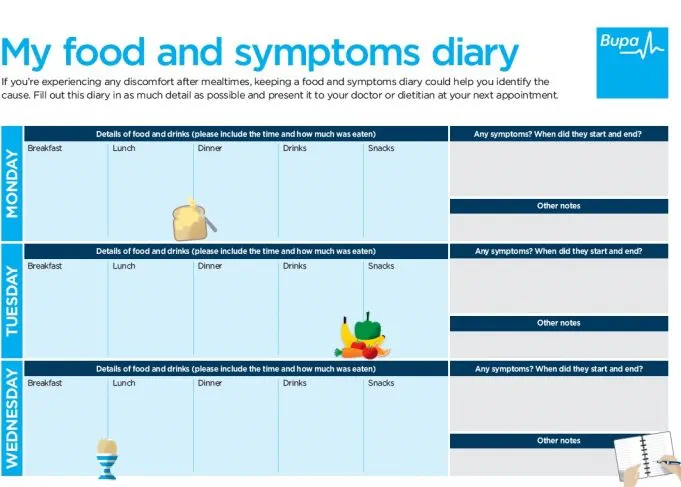Feel unwell after eating? Try our food and symptom diary
Do you often feel unwell after eating and want to find out why? It can sometimes be hard to figure out which foods are triggering your symptoms, but keeping a food and symptom diary can help. Here I’ll explore how to use a food and symptom diary to help you identify intolerances to certain foods.

Why should I use a food and symptom diary?
Using a food and symptom diary can be more accurate than simply trying to remember what you ate and how you felt. This can help you to notice any patterns between certain foods and symptoms, which you may otherwise miss.
You can also take your food and symptom diary to any appointments you have with a GP or dietitian. This will give them a great insight into what you eat and how certain foods affect you.
How can I keep a food and symptom diary?
We’ve created an easy-to-use food and symptom diary to help you monitor any symptoms you might be having. Simply download, print, and fill out your diary each day for a few weeks. You can also click on the image below to download the diary (PDF, 1MB).
It’s important to give as much detail as possible. For example, don’t forget to include any drinks or snacks you might have, and write down any symptoms, however minor. 
Top tips for keeping a food and symptom diary
To help you get the most out of your food and symptom diary, follow these simple steps.
- Stick to it. Try to fill out your food and symptom diary every day for at least two weeks, including over two weekends.
- Include your fluids. Don’t forget to note down all fluids. This includes caffeinated drinks (and any sugars added), juices and alcohol.
- Go into detail. Give as much detail as possible, including what you ate and how it was prepared. For example, instead of writing a ‘salad sandwich’, write ‘two slices of white bread, mayonnaise, cheese and tomato’. The same applies to the symptoms you have. Did you have them immediately after eating? How severe were they? How long did they last?
- Be honest. Even if you know your meal wasn’t the healthiest choice, write it down. It’s important for a doctor or dietitian to get a complete picture of your diet.
- Take it with you. Keep your food diary with you so you can make note of everything you eat throughout the day. If you try to fill everything out at once at the end of the day you might forget some drinks or snacks.
- Keep packaging. It might be helpful to keep food packaging as this can help a dietitian see exactly what was in the food.
Are you interested in learning more about your health? Discover more about our range of health assessments.
About our health information
At Bupa we produce a wealth of free health information for you and your family. This is because we believe that trustworthy information is essential in helping you make better decisions about your health and wellbeing.
Our information has been awarded the PIF TICK for trustworthy health information. It also follows the principles of the The Information Standard.

More diet and nutrition articles
Did you find our advice helpful?
We’d love to hear what you think. Our short survey takes just a few minutes to complete and helps us to keep improving our healthy lifestyle articles.
Legal disclaimer
This information was published by Bupa's Health Content Team and is based on reputable sources of medical evidence. It has been reviewed by appropriate medical or clinical professionals and deemed accurate on the date of review. Photos are only for illustrative purposes and do not reflect every presentation of a condition.
Any information about a treatment or procedure is generic, and does not necessarily describe that treatment or procedure as delivered by Bupa or its associated providers.
The information contained on this page and in any third party websites referred to on this page is not intended nor implied to be a substitute for professional medical advice nor is it intended to be for medical diagnosis or treatment. Third party websites are not owned or controlled by Bupa and any individual may be able to access and post messages on them. Bupa is not responsible for the content or availability of these third party websites. We do not accept advertising on this page.






